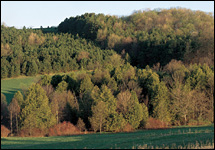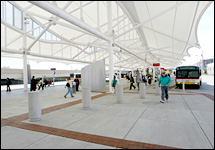Way Outside the Box
|  |
| MLUI |
| What do Wal-Mart’s everyday low prices really cost? |
Some New Jersey lawmakers recently introduced a bill requiring local governments to look much more closely at the regional effects of big-box stores. Local units would study how such developments influence retail employment, wages and benefits, existing businesses, commercial vacancies, public service costs, and vehicle miles traveled by happy shoppers before approving them. Such studies traditionally come from the big-box developers, not objective researchers. The proposal also requires local governments to huddle with adjacent jurisdictions about what the stores would do to those communities as well, and proscribes an appeals process in case the neighboring community doesn’t approve. The bill is currently awaiting a committee hearing.
PAYS® As You Go
|  |
| MLUI |
| Solar panels cut electric bills. |
Saving energy to cut down electric bills is fine, but the pesky upfront cost of improved insulation or new appliances is a roadblock. Now there’s an innovative end run, called PAYS®, that the Michigan Public Service Commission recently asked DTE Energy to consider implementing for its customers. Pay As You Save programs finance everything from compact fluorescent light bulbs to high-efficiency furnaces, then funnel some of the immediate electric bill savings to repaying the loan and send the rest to the customer. The bill goes even lower when the loan is repaid. Many organizations and businesses wrote Edison supporting the idea and are now meeting with the company. There’s more on this bright spot at
www.paysamerica.org, including success stories from New Hampshire utilities. To get involved in wooing Edison on a great way to avoid building more fossil-fueled power plants, contact Phil Shepard at 517-332-0761 or
shepard@acd.net.
All Wet
When Boyne City officials announced plans to build a wastewater plant on the Boyne River upstream from town, the Friends of Boyne River sued. As Friends member Larry Maltby put it the Traverse City Record Eagle: “Why the city wants to put that effluent in the river, then run it past all of the downtown businesses, past where the tourists fish and the mouth of the marina, is a mystery.” It’s also a mystery why Boyne officials built a brand new city beach right next to the current wastewater plant, a move that helped trigger their drive to build the new wastewater facility elsewhere. Federal judge Gordon Quist has already ruled against the city’s attempt to move the suit from an elected circuit court to a federally appointed one, and ordered Boyne City to pay the Friends’ legal costs for contesting Boyne’s attempt to change courts. Reach the river-loving Friends at P.O. Box 151, Boyne City MI 49712.
Who Do You Trust?
|  |
| MLUI/Gary Howe |
| Killing a tax break could hurt many land conservancies. |
A Congressional committee is suggesting ruining a program that has protected hundreds of thousands of acres of land from development. The committee proposes drastic cuts in income tax deductions for people who sign “conservation easements,” which permanently surrender a property’s development rights. People living on the land they are conserving would lose all deductions; all other deductions would fall by two thirds. Since many people sign easements because of the tax advantages, the land trusts that solicit and administer easements would stall; governmental land conservation efforts, which often are coordinated with trusts, would flounder. Check
www.lta.org for take-action tips.
Applying HEAT
|  |
| MLUI/Gary Howe |
| Hamtramck stops a medical incinerator. |
The Hamtramck Environmental Action Team scored a major victory for cleaner air and a healthier community in January, when the Michigan Department of Environmental Quality denied a request by Medical Waste Services to expand its incinerator there. HEAT, Sierra Club’s Michigan Chapter, ACCESS, and the Ecology Center worked for years to shut down the operation. The DEQ press release announcing the denial of the company’s expansion request cited MWS’s long record of ignoring air quality rules and failing to implement an agreed upon mercury reduction program as key factors in the decision. The DEQ added it would now attempt to permanently shut down MSW’s current Hamtramck operation.
Animal Instincts
|  |
| MLUI |
| Rapid suburbanization threatens wildlife. |
Sprawl hurts people, but it also harms plants and animals, according to a new study by Smart Growth America, a non-profit in Washington, D.C. The report, prepared in cooperation with the National Wildlife Federation and NatureServe, found that the rapid conversion of farmland and open space into subdivisions, shopping centers, roads, and parking lots in the nation’s largest, fastest growing metropolitan areas threatens one out of every three of America’s endangered plants and animals. The report, at
www.smartgrowthamerica.org, says stemming this lethal tide requires better local land use patterns and improved state and national natural resource and transportation policies. It warns that if nothing changes, most essential wildlife habitat in those regions will be lost within 20 years.
Green Loans
|  |
| MLUI |
| Rapid suburbanization threatens wildlife. |
Thinking of buying a home, or refinancing your current one? An innovative Fannie
Mae-based mortgage underwrites big energy efficiency projects that save homeowners hundreds, perhaps thousands of dollars in annual energy costs. Such “Energy Efficient Mortgages” offer up to 15 percent of a house’s appraised value, not its equity, to purchase approved energy-saving techniques, from better insulation and tighter windows and doors, to high-
efficiency furnaces and appliances, to solar hot water and electricity installations. Exactly one Michigan company, Indigo Financial Group of Lansing, administers this green deal. Reach them at
Joel@LansingMortgages.com or
517-483-5121. Tell ‘em the Institute sent ya!
Build It and They Will Ride
|  |
| MLUI/Bruce Giffin |
| Grand Rapids has a new bus station. |
It’s hard to tell, but Americans are driving less and riding public transit more. A study by the Victoria Transport Policy Institute, a Canadian research group, finds that the steady rise in auto miles across the 20th century stalled in 2000 and is now declining. The study says public transportation’s numbers are increasing thanks to the quality rail and bus systems smart metro areas are building, the construction of bike and pedestrian paths and, with existing transit systems, price incentives and service expansions and improvements. Check
http://www.vtpi.org/future.pdf for more information. Learn more about Michigan’s public transportation issues by typing “transit” into the Institute’s search engine, at
www.mlui.org.
They Showed Us Some Money
|  |
| MLUI |
| U.S. House votes more cash for transit. |
The U.S. House has done its part to pass TEA-LU, a six-year federal funding bill for highways and public transportation. The bill, which now goes to the Senate, boosts spending on bus and commuter rail systems by about $2.6 billion per year, to about $8.6 billion per year, a 44 percent increase. President Bush’s current budget proposal seems to support those numbers. Meanwhile, the President has called for drastic cuts in Amtrak, the national rail system; its budget is determined by a separate bill unrelated to TEA-LU. For the latest news on the push for better federal funding for transit of all sorts, as well as ways you can advocate for it, visit the American Public Transportation Association’s Web site,
www.apta.com. All aboard!
Greenbelt GAINS
|  |
| MLUI/Pat Owen |
| Greenbelts help farmers stay in business. |
In November 2003, voters in Ann Arbor and Ann Arbor Township approved millages to purchase open land and farmers’ development rights near the city limits. The goal: A “greenbelt” that slows sprawl and encourages Smart Growth. While some grumble that the city’s and the township’s greenbelt purchasing is moving too slowly, the program triggered more anti-sprawl victories in three adjacent townships in November. By a three-to-one margin, voters in Scio Township, immediately west of Ann Arbor, approved a millage that meshes with the Ann Arbor program. Voters in Ann Arbor Township ousted their township clerk, who is suing the township to force it to accept a massive mobile home park on prime agricultural land. And voters in neighboring Northfield Township pushed out some township board members who are greenbelt opponents and replaced them with greenbelt supporters.
Caveat Pre-emptor!
Want to know if a house you might buy is built on dioxin-contaminated land? State Senator Tony Stamas and state Representative John Moolenaar must think mid-Michiganders don’t care. They are planning legislation allowing homeowners in the Saginaw Valley, near Midland, where dioxin contamination levels frequently soar above the state’s standards, to withhold test results for any for-sale properties. Last May Senator Stamas and Representative Moolenaar unsuccessfully proposed raising state standards tenfold, to the federal level, to define the problem out of existence. To track the new bill’s progress go to www.michiganlegislature.gov/ and click on “Bills.”
Stay of Execution
|  |
| MLUI/Stephanie Rudolph |
| Confined cows lunch at Vreba-Hoff Farms, in southcentral Michigan. |
With many rural residents alarmed by the gag-inducing stench of livestock factories, aka Concentrated Animal Feed-ing Operations, the U.S. Environmental Protection Agency decided in 2002 to measure the problem scientifically. This January — over two years later — EPA announced what the Sierra Club’s Anne Woiwode calls the “No CAFO Polluter Left Behind” program: The agency will pick 28 offending factories that apply, forgive them their trespasses, level modest fines and monitoring fees, measure — for two years — exactly how bad their air is, derive “estimating methodologies,” and eventually proscribe steps for protecting public health. No word on what EPA will do about the hundreds of non-participating factories that, like the participating ones, continue to raise big stinks. Fortunately, the Michigan Department of Environmental Quality is now cracking down on offending livestock factories in our state. For more, type “CAFO” into our search engine, at
www.mlui.org.















